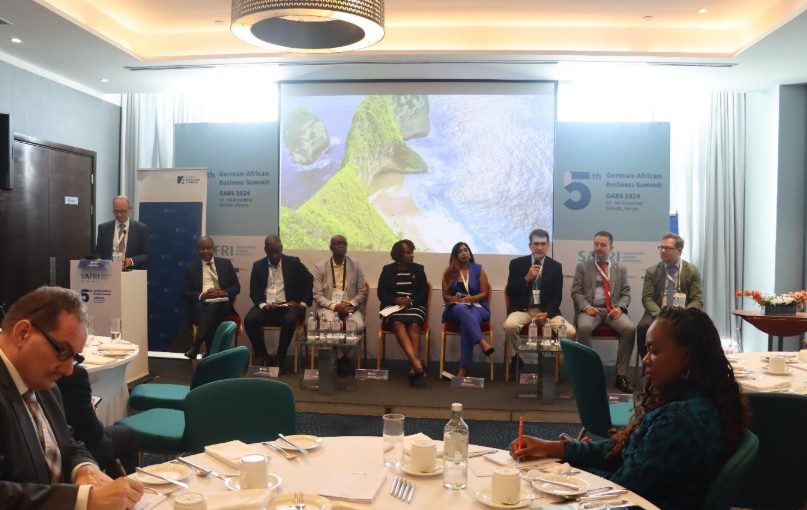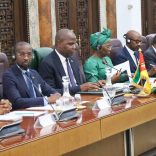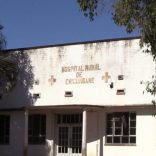Mozambique delays ban on ethanol-based alcohol by three months
“The mining industry in Mozambique is generating many jobs and business opportunities”

Left to Right: Standing H.E Ronald Munch (Ambassador of Germany to Mozambique). Seated: Gil Bires (General Director of APIEX), Wilson Mujovo (Head of Artisanal Small-Scale Mining, MIREME), Sokwani Chilembo (President of MIASA), Monica Gichui (Consultant with AWIMA for Africa Maval) Selleen Sewpershad (Head of Competence at AHK Sub-Saharan Africa, Cedric Simonet (CEO, Altona Rare Earths), Geert Klok (Chairman of the Board, Chamber of Mines of Mozambique) & Christoph Neuberg (CEO – IHK Chemnitz). [Photo: CMM]
Speaking at the 5th German-African Business Summit (GABS) Nairobi, Kenya, Chairman of the board of the Chamber of Mines of Mozambique, Geert Klok, said the mining industry in Mozambique is generating many jobs and business opportunities. Over the past 20 years, the country’s mining industry has generated over 10.000 direct jobs and a multiple of that in indirect jobs as well as business opportunities for national and international suppliers.
In the panel discussion themed “Mozambique’s role in the international critical minerals discourse” moderated by H.E Ronald Munch, German Ambassador to the Republic to Mozambique, aimed to address pertinent questions such as;
- The Investment-climate & opportunities for the Mozambican Mining Sector: Status and Improvement needs,
- Critical Minerals and Metals: Dynamics between Mozambican Mineral Resources and European Needs.
Klok highlighted that the country is a large producer of coal, heavy sand minerals, natural graphite and gemstones. The mines are often located in rural areas traditionally lacking qualified staff. The industry has trained a lot of the professionals in the mining sector. The mining sector created over 10.000 formal direct jobs and several tens of thousands of indirect jobs. Mining companies offer a lot of opportunities for suppliers of spare parts, consumables and logistics and entirely new supply chains have been built. Klok mentioned the Moz Parks initiative aiming to establish industrial parks in all Mozambican provinces, with mines and oil & gas projects as their anchor clients. The first of these industrial parks has already opened in Nampula province next to the Kenmare heavy sands mine.
Cedric Simonet when questioned about the opportunities and challenges, Simonet said “In terms of business environment, it’s generally positive, the first step that I look at a mining country, I verify how easy it is to obtain a mining license. Furthermore, if you look at the mining cadastre of Mozambique, you will observe that the licenses displayed are mining licenses and not only exploration license in comparison to Kenya which only shows the application status. However, the ease of doing business it is not as straightforward as Kenya, where most applications are done online and are usually available within hours. Such processes in Mozambique tend to take a lot more time due to bureaucracy and this is an aspect that can be improved”
When addressed with the same question Gil Bires mentioned that “the government approved the PRONAI program with the aim of stimulating the local transformation of commodities, the government wants to shift the approach from country that is oriented to exporting commodities to a country that processes the minerals within, in order to create more jobs, increase tax revenue and other associated benefits from the mining sector which is a key driver of the economy”.
When questioned on the dynamics between Mozambican mineral resources and European Needs, Christoph Neuberg said the following. “Two main reasons primarily interest Germany. The first reason that brings Germany to Mozambique is the critical raw material issue and the second is the joint project funded by the German government with the Chamber of Mines of Mozambique (CMM) in order to help bring minimum conditions to the mining sector of Mozambique”. “This project presents a win-win situation which will help in bringing development to the local communities and the German economy. There are challenges such as ESG criteria, Germany has new legislation on supply chains which soon will become European law. These rules will be strict and will require that supply chains to be certified according to ESG standards. The project with the CMM aims to bring awareness and find means to help bring about certifications so that the minerals can be sourced” according to Neuberg. Neuberg sees an opportunity to introduce German companies based in Saxony to the Mozambican market. Furthermore, Saxony also has one of Germany’s oldest mining universities which teaches and trains a lot of Mozambican mining experts.
The event was organized by the Konrad Adenauer Stiftung (KAS) & Chamber of Mines of Mozambique in Cooperation with IHK Chemnitz












Leave a Reply
Be the First to Comment!
You must be logged in to post a comment.
You must be logged in to post a comment.